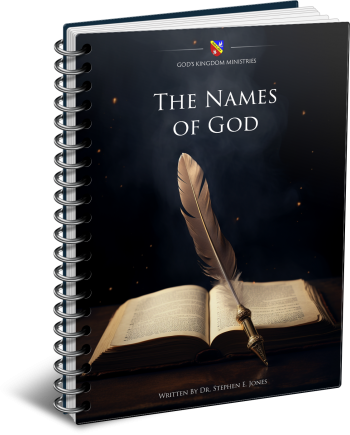Latest Posts
View the latest posts in an easy-to-read list format, with filtering options.

God has revealed His primary name as Jehovah (or Yahweh). But there are 12 variations of Jehovah that reveal specific aspects of His nature so that we can get to know Him.
Category - General

The third revelation of the name of God is Jehovah-Nissi, “My Banner.” It came to Moses in the context of the war against Amalek in Exodus 17:8-16. We read in Exodus 17:15, 16,
15 Moses built an altar and named it The Lord is My Banner [Jehovah-Nissi]; 16 and he said, “The Lord has sworn; the Lord will have war against Amalek from generation to generation.
This banner is a military flag or standard, taken into battle. Hence, Jehovah-Nissi is closely connected to Jehovah-Sabaoth, “The Lord of Hosts (army).” For believers, the banner that He raises over us is Love (Song of Solomon 2:4). It is His own nature, for “God is love” (1 John 4:8). The host of God conquers by the power of Love, because “Love never fails” (1 Cor. 13:8).
Conquering Amalekites may not give the appearance of love, but those who understand the restoration of all things will see it immediately. In fact, all of the judgments of the “fiery law” are rooted in love, because by putting men under the law, “the inhabitants of the world learn righteousness” (Isaiah 26:9). Being under the law means they have to serve out the sentence of the law until they are redeemed or until the year of Jubilee arrives.
In other words, their evil nature is restrained as they are taught to work and live in a righteous manner. It is a time of Kingdom enculturation and sanctification. This time spent under the law ends finally with the great Jubilee, where all of creation is “set free from its slavery to corruption into the freedom of the glory of the children of God” (Rom. 8:21).
God’s determination to have war with Amalek until it is fully consumed shows how determined (zealous) He is to save all mankind and to put all things under His feet. Judgment for some can be severe, but it is designed in the end to bring all of creation back into alignment with their purpose for being.
This is suggested also by the “standard” or “banner” (noos) that is raised in Isaiah 59:19 KJV, when we read this in its context. Isaiah 59:16 begins this section, saying,
16 And He saw that there was no man and was astonished that there was no one to intercede; then His own arm brought salvation to Him. 17 He put on righteousness like a breastplate, and a helmet of salvation on His head, and He put on garments of vengeance [naqam, to restore the lawful order by reestablishing justice] for clothing and wrapped Himself with zeal as a mantle.
This pictures God finding no man capable of interceding for humanity, so He sent His Son Yeshua who would bring “salvation” (yasha). The Son of God armed himself with spiritual armor and “wrapped Himself with zeal” (kina), which describes His determination to finish what He starts.
This is the same zeal shown when He cleansed the temple in John 2:13-17. John says in verse 17,
17 His disciples remembered that it was written, “Zeal for Your house will consume Me.”
John was remembering Psalm 69:9, where the Hebrew word for “zeal” is kina. John shows that the cleansing of the temple was the main explanation of the first miracle-sign in his gospel—the miracle at Cana (or kina). See John 2:1. The underlying lesson is that Christ’s zeal makes him passionate about changing us into His image, even as He changed the water into wine. What is usually missed is the fact that His zeal was directed at the corrupt priests in the temple. He will not rest until He has changed their hearts as well.
Getting back to Isaiah 59:19, KJV, we read,
19 So shall they fear the name of the Lord from the west, and His glory from the rising of the sun [east]. When the enemy shall come in like a flood, the Spirit of the Lord shall lift up a standard [noos, “standard, banner”] against him.
Then we see the banner’s connection to the New Covenant in Isaiah 59:21, KJV,
21 “As for Me, this is My covenant with them,” saith the Lord; “My Spirit that is upon thee, and My words which I have put in thy mouth, shall not depart out of thy mouth, nor out of the mouth of thy seed, nor out of the mouth of thy seed’s seed,” saith the Lord, “from henceforth and for ever.”
This is very similar to what Jeremiah called “a new covenant” (Jer. 31:31-34), where everyone will know the Lord and understand His laws, so that Bible teachers will no longer be needed. I look forward to retirement, so I can begin a new career in the ages to come.
The point is that when God raises up His standard, He wears the hat of Jehovah-Nissi. (Nissi is noos, “banner,” with an “i” at the end which makes it possessive, “My Banner.”) The result is that His zeal makes Him passionate about subduing all enemies, so that God can be “all in all” (1 Cor. 15:28). His banner will obliterate all enemies by turning them into friends. This is the result of the New Covenant, and it is very different from the result of the Old Covenant.
The Old Covenant was man’s vow to God (Exodus 19:8); the New Covenant is God’s vow to man. When man makes a vow, he is responsible to keep it zealously. He raises his standard against evil and finds himself defeated, for his flesh lacks the power to redeem. But when God sent His Son to raise His standard of Love, He could not fail. That is because man has to learn to love, whereas God is love from the beginning.
When we are attacked, spiritually, mentally, or physically, we have the assurance that Jehovah-Nissi is there to raise up a standard to drive out the enemy. Isaiah 54:15-17 says,
15 If anyone fiercely assails you, it will not be from Me. Whoever assails you will fail because of you. 16 “Behold, I Myself have created the smith who blows the fire of coals and brings out a weapon for its work; and I have created the destroyer to ruin. 17 No weapon that is formed against you will prosper; and every tongue that accuses you in judgment, you will condemn. This is the heritage of the servants of the Lord, and their vindication is from Me,” declares the Lord.
The “fire of coals” is, perhaps, what Paul had in mind when he spoke of heaping coals of fire upon the neighbor’s head as the divine act of “vengeance” in Rom. 12:19-21. In those days, if the fire died out, a woman might go to her neighbor and request some coals. She would then put them upon her head (in a jar).
It was often the case that neighbors did not get along very well. Sometimes a neighbor would want to exact petty revenge by refusing to give away any hot coals—or, perhaps, to give very few coals to the neighbor. Paul tells us that they should overcome evil with good by heaping coals of fire upon her head. This is divine vengeance. It is not the same as human vengeance. That is why “vengeance is Mine, says the Lord.” People normally do not know how to perform divine vengeance, because they are oriented toward overcoming evil with greater evil.
This, I believe, is the context of Isaiah’s assurance that “no weapon that is formed against you will prosper.” Paul says we are more than conquerors (Rom. 8:37). But we need to learn how to conquer with the Sword of the Spirit that is in accordance with the proper definition of God’s vengeance.